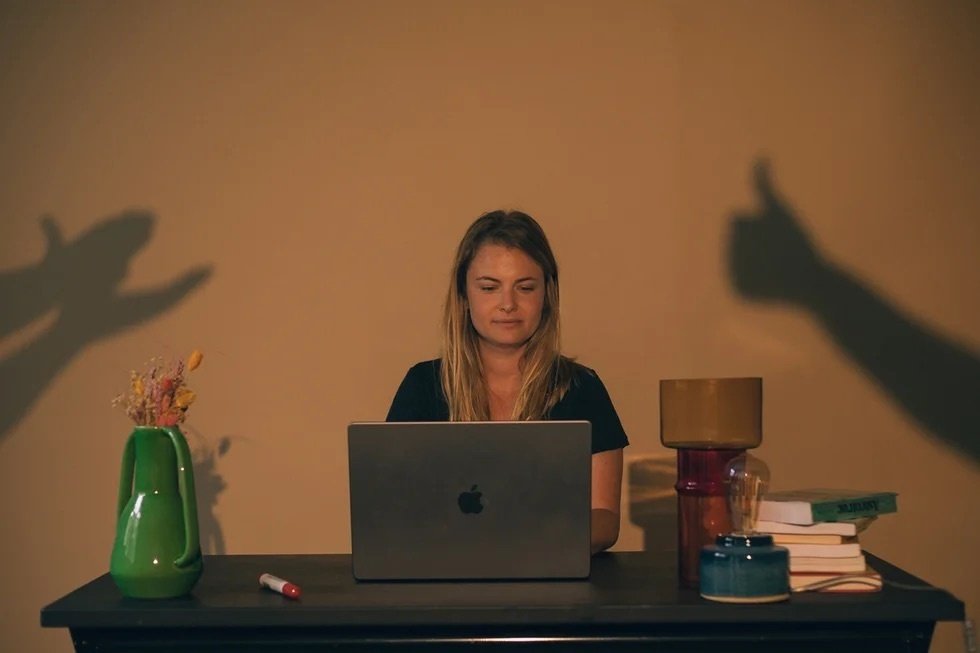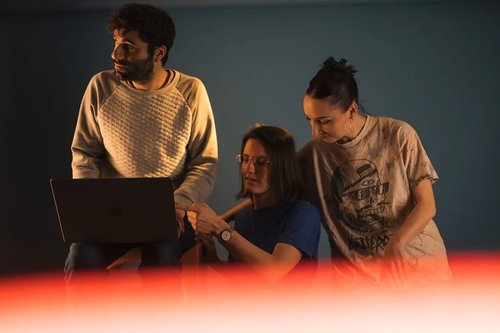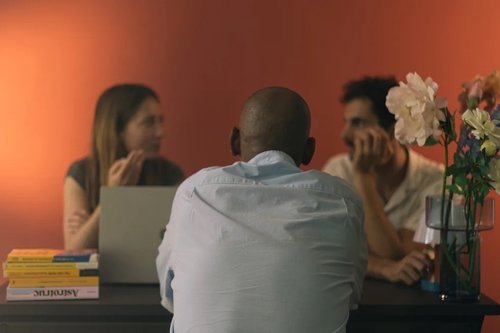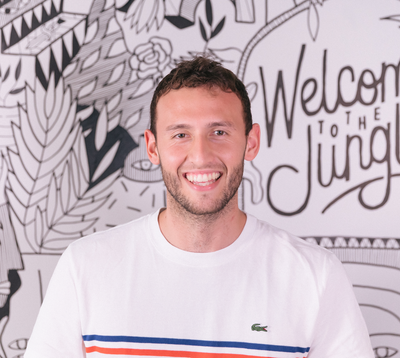The Pratfall Effect: Can screwing up in a job interview make you more likable?
14 oct. 2024 - mis à jour le 14 oct. 2024
4min

Have you ever felt like one small blunder ruined your entire job interview? You were on track for the perfect pitch but an unexpected question, a forgotten ‘thank you’, or an answer slightly too bold planted a tiny seed of doubt in your mind. No need to panic! A slight slip-up won’t blow your entire interview—in fact, the opposite is true. According to the Pratfall Effect, that blunder could be what makes you irresistible. Want to learn exactly how? Neuroscientist and expert of The Lab Albert Moukheiber is here to dive into this phenomenon.
Paul’s story
His day was almost perfect. From the small talk upon arrival to more serious discussions about the job, the final interview for his dream job was off to a great start. He was hitting it off with a potential future manager who was impressed by his background and charmed by his charismatic personality. But as their conversation came to an end, the unthinkable happened: Paul’s knee hit the table and sent the interviewer’s coffee cup flying. The interviewer found himself with a stained shirt and damp pants. Paul apologized profusely, then went home to lament the clumsiness that had surely cost him the job. He tried to forget about his dream job that had gone down the drain.
“All is not lost!” Moukheiber reassures after hearing Paul’s story. “First, if the recruiter is level-headed, and Paul is a perfect match for the job, the interviewer shouldn’t forget about all this just because of a coffee accident,” he explains. “Even if it seems paradoxical, Paul’s screw-up could make the recruiter like him even more.”
A cognitive bias revealed in the 1960s
Believe it or not, spilling coffee on someone could make them think better of you. It’s counterintuitive but scientifically proven, it’s the Pratfall Effect. Moukheiber explains that it’s a cognitive bias derived from the Halo Effect, where each event is interpreted in line with our first impression of a person. “The Pratfall Effect is an extension of the Halo Effect. Under certain circumstances, when someone messes up in front of you, it reinforces your positive opinion of them instead of negatively impacting it.”
Let’s go back to the 1960s and look at the work of American psychologist Elliott Aronson, who published a paper on the Pratfall Effect. In an experiment, Aronson asked students of the University of Minnesota to listen to recordings of fictitious candidates on a radio quiz show.
- The first candidate was brilliant, excelling by correctly answering almost all of the quiz questions.
- The second candidate was mediocre, only answering a third of the questions correctly.
- The third performed as well as the first, nearly perfect, but clumsily spilled his coffee at one point during the recording.
- The fourth candidate, as mediocre as the second (answering with only a third of the correct answers), also had butterfingers and spilled his cup of coffee.
The results showed that the most liked candidate at the end of the show was the smart but clumsy one, even better liked than the brilliant candidate who didn’t slip up. So how do we explain that the result of such a faux pas is positive? “Your mistakes make you human because everyone makes them,” explains Moukheiber. “Your blunder allows those who admire you to identify with you, which is appealing to them and will make you even more likable.” It shows that you’re not perfect and you become more real in their eyes.
In a job interview, where we tend to paint an idealized portrait of ourselves, hiding our flaws and only talking about our successes, making a mistake like spilling coffee makes us real human beings and even more desirable in the eyes of hiring managers. More specifically, because of your mistake, it’s the self-esteem of the person interviewing you that’s boosted, and that’s what makes you likable. “If I realize I have something in common with Einstein tomorrow, I’ll have a better image of myself, and that will make him seem even more amazing,” says Moukheiber.
An advantage reserved for the best
Moukheiber emphasizes that for cognitive bias to occur, you must already be in good standing with your interviewer. “We’re only talking about cases where the person who makes the botch is incredible, or at least appears to be. That’s why I cited Einstein in my example. For the Pratfall Effect to occur in a job interview, the recruiter needs to be in awe of you. If you’re just good or average, it won’t have an effect,” Moukheiber explains. For the Pratfall Effect to enhance your interview performance, you need to have already impressed the recruiter. “The Pratfall Effect is the cherry on top, but it’s not what makes your entire performance,” says Moukheiber.
Also, the bias isn’t automatic. “There are several parameters that modulate the effect,” Moukheiber explains. First, there’s the degree of severity of the fumble. “Is it a harmless blunder, or a colossal error with devastating consequences?” A spilled cup of coffee will probably go over better than slamming the door on the recruiter’s pinky and crushing it, for example.
A main factor that influences the Pratfall Effect is the observer’s self-esteem. “If they have low self-esteem, the effect is likely to occur, since your mess-up allows them to boost their self-esteem,” Moukheiber shares. “On the other hand, the higher the observer’s self-confidence, the less likely they are to experience a cognitive bias.”
The bottom line: Keep it in perspective
If there’s one lesson to take away from the Pratfall Effect, it’s to put the impact of an ill-timed screw-up in the middle of an interview or during a work meeting into perspective. If it happens to you, don’t worry. In the worst-case scenario, your fumble won’t have an impact. However, if it affects you negatively, it’s probably because your image wasn’t great to begin with, so you haven’t lost anything. In the best case, “You have everything to gain!” says Moukheiber. “Don’t lose your cool. Apologize for the mistake and stay focused. Try not to stress out because it hasn’t necessarily discredited you.” If you made an excellent impression before, your mess-up might be what seals the deal for the recruiter and they hire you.
However, be careful not to misinterpret the situation. The Pratfall Effect isn’t something to try to produce, Moukheiber points out. “I would never advise you to deliberately spill your coffee on an interviewer hoping to score points. It’s impossible to provoke the Pratfall Effect, except in a laboratory.” So just be yourself. Be authentic and relaxed, and if by chance you make a mistake, it will be okay. Remember, the cards are still in your hand.
Photo: Welcome to the Jungle
Follow Welcome to the Jungle on Facebook, LinkedIn, and Instagram and subscribe to our newsletter to get our latest articles every week!

Inspirez-vous davantage sur : Réussir son entretien

Why are you leaving your job? Here's how to nail the answer
Caught off guard by 'Why are you leaving your job?' Here's how to flip this tricky question into a spotlight on your goals and potential.
24 déc. 2024

Standing out in an interview: Creative responses to common questions
Answering common interviews with common responses isn't going to get you far in today's job market. Here's how to truly stand out!
26 nov. 2024

How to bring up your long-term career goals in an interview
Be honest but strategic. The key is aligning your goals with the role while showing flexibility and ambition. Avoid faking it!
24 sept. 2024

Is honesty the key to discussing your weaknesses?
Are your weaknesses holding you back in an interview? A bit of honesty can flip the script and make your flaws work in your favor.
21 août 2024

The DEI-decoder: Assessing values during an interview
DEI is a crucial part of company culture. So, how can you evaluate it during the recruitment process?
02 juil. 2024
La newsletter qui fait le taf
Envie de ne louper aucun de nos articles ? Une fois par semaine, des histoires, des jobs et des conseils dans votre boite mail.

Vous êtes à la recherche d’une nouvelle opportunité ?
Plus de 200 000 candidats ont trouvé un emploi sur Welcome to the Jungle.
Explorer les jobs


